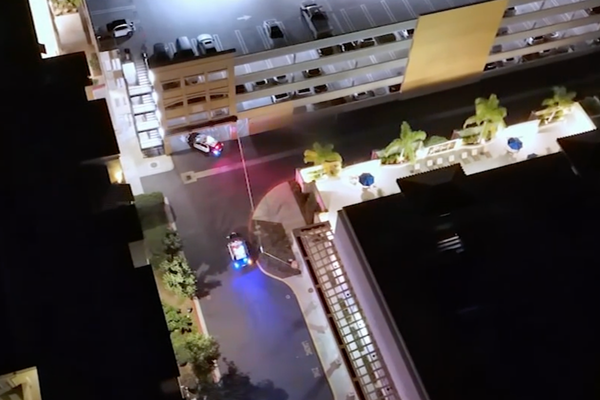For ecologist Damien Cook there's no sweeter sound than the near-deafening dawn and dusk chorus of birds and frogs at Wirra-Lo wetland.
Among them is the distinctive gravelly croak of the nationally endangered growling grass frog, re-discovered here in 2017, and the mating call of the equally rare Australasian bittern, once a common bird on the inland flood plains.
Wirra-Lo, a remnant wetland on the lower Loddon River close to the Murray River in north-central Victoria, is currently teeming with life courtesy of a massive flood in October that inundated every flood plain in the region.
Protecting wetlands
Wetlands are the world's most threatened ecosystem due to urbanisation, agriculture, pollution, invasive species, disrupted flows due to dams and water diversions, and a host of other reasons.
Australia's scorecard is just as bleak.
That's why Wirra-Lo is so special.
"It's rare in as much that it hasn't been totally flattened with earthmoving machinery for agricultural production," said retired dairy farmer Ken Hooper.
And it's why ecologist Damien Cook has moved heaven and earth to ensure its restoration and preservation.
"In this region here up to 90 per cent of the wetlands have been drained or cleared or cropped, and there's been a lot of clearing of the native vegetation," Mr Cook said.
It was also the inspiration for Mr Cook and his partner to establish the Wetlands Revival Trust.
It aims to protect and restore ecologically significant wetlands in the southern Murray-Darling Basin.
Through crowdfunding, donations and grants, the not-for-profit trust has raised enough money to make the 180-hectare property at Murrabit West its first acquisition.
The massive October flood showed the vital role that wetlands play in buffering the land from such a deluge of water.
"All the farmland around here was all flooded and burnt and blackened, barren from the floodwaters," Ken Hooper said.
"This property here, Wirra-Lo was just alive with life, an absolute gem in a sea of waste farmland."
As the spring floodwaters have receded wading birds have feasted in the shallows, getting plump on aquatic life such as carp, nesting and breeding in the lush vegetation.
Extinct and endangered species
There's the distinctive honk of magpie geese that are also breeding, much to Mr Cook's delight. The species, so synonymous with Australia's Top End, once ranged across southern Australia.
"They were shot to extinction in southern Australia by 1900. They were used as a meat bird," Mr Cook said.
That they are breeding is proof that Wirra-Lo's restoration, including the planting of thousands of trees, is on the right track.
Ken and Jill Hooper are just as thrilled as the ecologists. They were dairy farmers when they bought the rundown property in 1992 primarily for its generous irrigation allocation.
But they quickly realised its ecological value far exceeded its grazing capacity.
"The wetland areas, the bush and all the rest of it — albeit a bit eaten out by cattle — we just fell in love with it," Mr Hooper said.
"It was the whole ambience of the place, the tree lines, the creek lines, the change as you moved through the place," Ms Hooper said.
Since then the couple has overseen the property's revival. But it put Ken on a collision course with the authorities.
Water and a natural wetting and drying cycle are vital for wetlands. But a decade ago, reforms to the district's irrigation system, including the removal of connecting channels, almost left the property high and dry.
Mr Hooper convinced the regional water authority to assure water, even during the worst of droughts.
"It was the first time in Victoria that public water had been put onto private land and that created a lot of hassles," Mr Hooper said.
"It took three years, but in May of 2015 almost to the day the first environmental water flowed into the full wetland and the place just started to come alive.
"From that time on it has been a developing, learning experience."
Restoring country
The Wetlands Revival Trust works with traditional owners including Uncle Ricky Kirby, a Barapa Barapa man.
For him and his people this is a place of immense cultural significance and a place of healing.
"Culturally it's like medicine when you see country coming back to its natural state," Mr Kirby said.
"This place has changed so much. You wouldn't have even thought this was once pastoral paddocks to feed livestock."
Mr Hooper said they want this property to be for the community, for scientific research, for environmental education, and to protect some biodiversity so that people can learn what can be done.
"The whole aim in the first place was to leave something, when we leave this earth to leave something behind. That was one of the driving forces," Ms Hooper said.
Mr Cook's many days at Wirra-Lo, carefully recording and documenting the multitude of species that live here, gives him reassurance the conservation efforts are working.
It also reaffirms the importance of wetlands.
"They're really absolutely key for a whole range of species. About half the endangered species are reliant on wetlands in Victoria," he said.
Watch ABC TV's Landline at 12:30pm on Sunday or on ABC iview.







